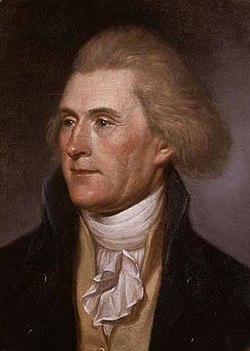History
Before George Washington appointed the pair to his cabinet, Hamilton and Jefferson didn't know each other well. In their first year in Washington's cabinet, the pair rarely clashed. Hamilton and Jefferson's views on government clashed. Hamilton saw cities as a foundation of society, which was necessary for wealth creation. Jefferson saw centralized government as tyranny and wished for a country of farmers. Jefferson also saw cities as “great sores.” [1] Washington also partially created the clash, as he assured each of the men that their position in the cabinet. [2]
Hamilton's financial plan made Jefferson suspicious and combined with what Hamilton called for at the Constitutional Convention, made Jefferson see Hamilton as a threat to his views on central government. The principal objection Jefferson had against Hamilton's Financial plan was against the proposal to create a national bank. [3] Jefferson also saw Hamilton as trying to replicate what he saw as the evils of Europe, specifically regarding social structures. Jefferson responded to this by forming the Democratic-Republican Party and hiring Philip Freneau to form the National Gazette. Furthermore, Jefferson denounced Hamilton's actions to Washington; Jefferson claimed that Hamilton called the constitution a “shilly shally thing” and that Hamilton wanted to restore monarchy in America. [1]
On February 15, 1791, Jefferson sent a letter to Washington expressing constitutional concerns about Hamilton's planned national bank, believing that the federal government had no place regulating the internal commerce of states with a bank, and asking for a presidential veto. After reading Jefferson's letter, Washington gave Hamilton a response to respond to the criticism. In his response, Hamilton outlined his doctrine of implied powers, that the federal government could do things that were granted implicitly by the powers given to them under the constitution. [4] Washington sided with Hamilton, who Washington thought would bring the country to a financially better place. [1]
Hamilton responded by forming the Federalist party and by denying Jefferson's claim of Hamilton wanted to bring monarchy back to America. Hamilton also told Washington that Jefferson was a threat to his economic plan. [1] In 1792, Washington wrote letters to Hamilton and Jefferson to ask them to work together. [2] Despite their differences, Hamilton and Jefferson called for Washington to serve a second term when Washington spoke of retiring and wanted America to remain neutral in French Revolution Wars. [1] Hamilton and Jefferson came to a compromise at a dinner on June 20, 1790, where Hamilton got his national bank and Jefferson got the capitol of the United States moved to the proposed Washington D.C.. [5] [6] This was later known as the Compromise of 1790. [6] Jefferson claimed that he was tricked in this deal, and believed that it was one of the worst deals he ever made. [7]
Jefferson retired from Washington's cabinet in 1794. Hamilton didn't believe that the retirement would last long. During the next three years, the pair didn't speak much with or on each other. Neither spoke on either of their scandals during this period. In 1796, Jefferson ran for the presidency, which Hamilton's party, the Federalists, called him a hypocrite for. When Hamilton commanded a large army that Congress ordered, Jefferson called Hamilton “our Buonaparte.” [1]
In the election of 1800, Hamilton was too focused on ensuring the defeat of John Adams to pay any mind to Jefferson. When the election ended in a tie between Aaron Burr and Jefferson, Hamilton threw his support behind Jefferson, seeing Jefferson as the better of two evils. After Hamilton's death, Jefferson spoke well of him. [1]
This page is based on this
Wikipedia article Text is available under the
CC BY-SA 4.0 license; additional terms may apply.
Images, videos and audio are available under their respective licenses.

